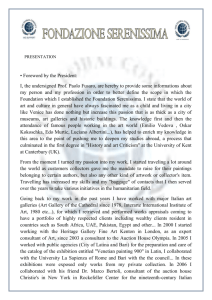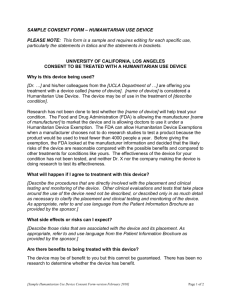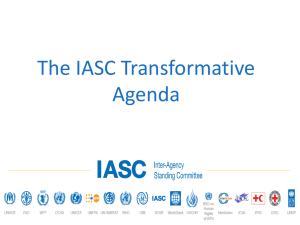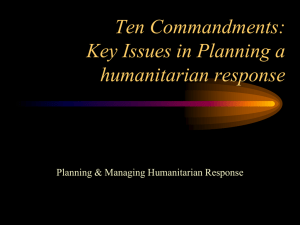Leadership Research Collaborative Doc
advertisement
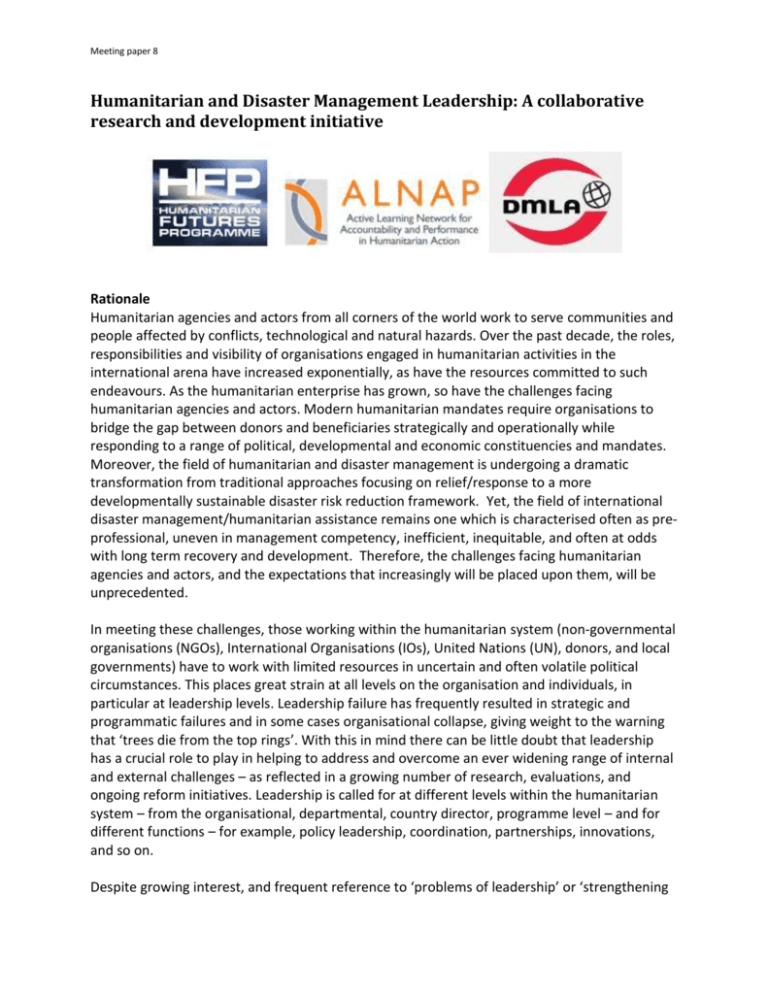
Meeting paper 8 Humanitarian and Disaster Management Leadership: A collaborative research and development initiative Rationale Humanitarian agencies and actors from all corners of the world work to serve communities and people affected by conflicts, technological and natural hazards. Over the past decade, the roles, responsibilities and visibility of organisations engaged in humanitarian activities in the international arena have increased exponentially, as have the resources committed to such endeavours. As the humanitarian enterprise has grown, so have the challenges facing humanitarian agencies and actors. Modern humanitarian mandates require organisations to bridge the gap between donors and beneficiaries strategically and operationally while responding to a range of political, developmental and economic constituencies and mandates. Moreover, the field of humanitarian and disaster management is undergoing a dramatic transformation from traditional approaches focusing on relief/response to a more developmentally sustainable disaster risk reduction framework. Yet, the field of international disaster management/humanitarian assistance remains one which is characterised often as preprofessional, uneven in management competency, inefficient, inequitable, and often at odds with long term recovery and development. Therefore, the challenges facing humanitarian agencies and actors, and the expectations that increasingly will be placed upon them, will be unprecedented. In meeting these challenges, those working within the humanitarian system (non-governmental organisations (NGOs), International Organisations (IOs), United Nations (UN), donors, and local governments) have to work with limited resources in uncertain and often volatile political circumstances. This places great strain at all levels on the organisation and individuals, in particular at leadership levels. Leadership failure has frequently resulted in strategic and programmatic failures and in some cases organisational collapse, giving weight to the warning that ‘trees die from the top rings’. With this in mind there can be little doubt that leadership has a crucial role to play in helping to address and overcome an ever widening range of internal and external challenges – as reflected in a growing number of research, evaluations, and ongoing reform initiatives. Leadership is called for at different levels within the humanitarian system – from the organisational, departmental, country director, programme level – and for different functions – for example, policy leadership, coordination, partnerships, innovations, and so on. Despite growing interest, and frequent reference to ‘problems of leadership’ or ‘strengthening leadership capacity’, there has been no systematic attempt to develop disaster management leadership. The sector has relied largely on the anecdotal stories about how the failures of the humanitarian sector are related to the failures of those who lead them. Rather less frequently, successful leaders in the sector and their achievements in particular operational or policy contexts take on an almost mythical status. Therefore, there is a need to strengthen and professionalise leadership of humanitarian and disaster management intervention programs in order to improve the impact, sustainability, consistency and quality of services provided by humanitarian organisations. Given the size and scope of the modern humanitarian sector, this gap clearly cannot remain unaddressed. It is arguably ever more important to improve understanding of the characteristics of, and influences on, humanitarian leadership. There is scope and potential for a collaborative research to explore leadership in a more structured and systematic fashion. A number of stakeholders in the humanitarian sector have launched a programme of research, training and education which is in the preliminary stages of being implemented. The rest of this note brings together some initial ideas about the goals, planned outputs and focus of such a collaborative research effort between ALNAP, Humanitarian Futures Programme (HFP), and Tulane University’s Disaster Management Leadership Academy (DMLA). Goal, proposed outputs and activities The overall goal of this collaborative research programme on humanitarian leadership is to achieve better results from humanitarian efforts. A key strategy to achieve this goal is strengthened leadership of humanitarian and disaster management interventions. Leadership must be accorded its rightful place as a core competency within and across organisations with humanitarian roles and responsibilities, and be institutionally supported and developed in ways which improve humanitarian performance, ultimately helping to realise the vision of a more strategic, relevant and effective humanitarian system. We propose a collaborative effort to foster humanitarian leadership through the delivery of the following specific and concrete outputs: • A detailed study and briefing papers, which will draw concrete conclusions about the limits and possibilities of humanitarian leadership in improving humanitarian performance, learning and accountability. • A series of case studies of humanitarian leadership, providing real-world narratives about humanitarian leadership in different social, environmental and disaster life cycle contexts. • A suite of leadership-related tools, ranging from surveys to strategic thinking tools and collaborative approaches, which can be used to strengthen leadership efforts. As part of this suite of tools a series of scenarios will be developed and tested to demonstrate the sorts of leadership requirements that will be needed in different humanitarian situations. • A leadership diagnostic in which leaders can test the relevance of their own leadership capacities to meet the challenges which 21st century humanitarian organisations will have to face. • Consultative meetings with different stakeholders to facilitate knowledge sharing about leadership approaches within organisations. In that context, efforts will be made to analyse present approaches used by such organisations to identify leadership qualities, and to engage them in longitudinal studies about the effectiveness of their present approaches and possible alternative approaches. • A formal sector-wide leadership network, to help strengthen leadership knowledge sharing, to help deliver tools and to provide a basis for distance learning elements. • Coordinated leadership development programmes, to be delivered by both academic establishments and specialised training and capacity providers, through a variety of delivery channels. In order to deliver these outputs, it is envisaged that the research will need to have three integrated focus areas, each with a number of specific related activities. Table 1 below outlines the first phase of a more extensive research programme. The latter will be developed, based upon the findings and conclusions arising from the first phase of the research programme. Table 1: Phase One Research Focus, Activities and Outputs Research Focus Activities Outputs A detailed study and briefing papers relating to humanitarian leadership To outline a(n) analytical and practical framework(s) to clarify the dimensions of leadership in the humanitarian sector (see Appendix I for a preliminary outline of such a framework) Discussion and conceptual development across the collaborating partners Series of evidence-based case studies of humanitarian leadership Incorporation of existing work A suite of leadership-related into framework (e.g. ALNAP tools and mechanisms and DMLA background work, LIPHIA.ORG, HFP OSAT tools, A formal sector-wide People In Aid Competencies) leadership network Consultative meetings with range of stakeholders (e.g. the ongoing ‘Learning to Lead’ series launched in London in April 2009 , and the November 2009 HFP Stakeholders Forum) Leadership development curricula, for use in both academic courses and professional development and training packages (e.g. Tulane Academy courses, RedR And Skillshare courses) To explore the various Desk and literature reviews leadership models which have been applied in sectors outside Interviews with leadership the humanitarian sector experts and researchers Survey based research on leadership across the sector, disaggregating data by agency type and leadership role To analyse and explore leadership in specific humanitarian contexts in more detail, identifying the range of approaches to leadership that are relevant in different contexts of international humanitarian action and establishing a baseline of the ‘current state’ of humanitarian leadership Interviews and case-study research on humanitarian leadership, as well as more innovative approaches including leadership modelling, scenarios, narratives and life history approaches and so on Research on existing leadership competencies and institutional supports for leadership such as succession, mentoring and leadership networks Collaborating partners While there is currently a paucity of research specifically looking at the role of leadership in humanitarian relief, a number of organisations are now undertaking to look more systematically at leadership in the sector. In light of this, this collaborative research initiative aims to bring together and create synergies between the work of each of the partners and more widely. Currently, the following stakeholders are closely involved partners in the collaborative research and development effort: • • • • ALNAP Secretariat Staff Humanitarian Futures Programme (HFP) at King’s College London Disaster Management Leadership Academy (DMLA), Tulane University Margie Buchanan-Smith, Independent Consultant There are also a number of partners, who are interested in providing advice and inputs to the research and development work, but who have a more specific interest in helping to implement the specific outputs: • • • • • People In Aid RedR Skillshare ICVA InterAction Preliminary discussions have also been held with others with an interest in this area, and it is hoped that more organisations will be interested in becoming collaborators in this new and exciting initiative. Next Steps Once the stakeholders have been mobilised, the next steps are to develop a concrete workplan for taking this work forward from June 2009 onwards. The immediate next step will to be clarify an analytical framework, which can then be used to inform the development of a range of specific research tools and methods. It is envisaged that ALNAP, HFP and DMLA will work together to play a coordinating role within this process, and well as helping to provide initial substantive and research inputs. APPENDIX I: Draft Framework for Further Discussion Preliminary work undertaken in this area has identified six distinct areas which need to be considered in more detail in any research and development initiative. Figure 1 below provides a schematic of leadership and its influence on humanitarian interventions. The model supposes that leaders have a transformative effect on humanitarian intervention processes through policies and management strategies that determine allocation of human, physical and monetary resources leading to more effective humanitarian interventions (results). Leadership effectiveness is directly influenced by psychological traits of leaders as well as skills and competencies that these individuals possess and the context in which a leader is operating. Capacity development initiatives include HR policies related to recruitment as well as education/training/mentoring and analytical tools that lead to more effective recruitment and empowerment of leaders. • Leadership as personal styles and traits: what qualities do leaders have? A key starting point will be to better understand the kinds of styles and traits evident across the sector • Leadership in cultural contexts: As a growing number of actors outside the traditional humanitarian sector become involved in humanitarian activities, cultural determinants may well play an increasing role in different forms of humanitarian leadership • Leadership as competencies: what are leaders good at? Both individual and group-based competencies should be considered here. Within this area, scope of interests (e.g., understanding of relevant disciplines such as social anthropology, social psychology and aspects of the “hard sciences”) should be considered within the rubric of potential competencies. • Leadership as process: what do leaders do, and when can they do it? This will have two dimensions: o the process of leadership i.e. what leaders do; o the scope for enhanced leadership in the multiple processes which make up the humanitarian system. • Leadership as results: what do leaders achieve? Is there a set of things that result from effective leadership - through the effective of application of appropriate styles, competencies and processes? If so, how are these results supported, encouraged and judged? How does this relate to results as currently seen from an institutional and sectoral perspective? • Leadership in context: what influences leadership? It is important to understand leadership as it relates to and is shaped by context. In particular, appropriate leadership approaches vary by factors such as crisis type (slow onset, natural disaster, complex political emergency), national and regional emergency context (political and cultural considerations), organisational setting (Red Cross, donor, UN, INGO, national government, national NGO), age, gender, etc. Research Objectives: 1. Stock-taking of the status of leadership now (multiple method research) and competencies/skills of leaders currently. What is leadership effectiveness? What are baseline levels of leadership skills and competencies? 2. What is the aspired to state? What do we know about what is required of good leaders in different contexts? 3. How do we get there? What capacity development strategies can result in strong, effective humanitarian leadership?





